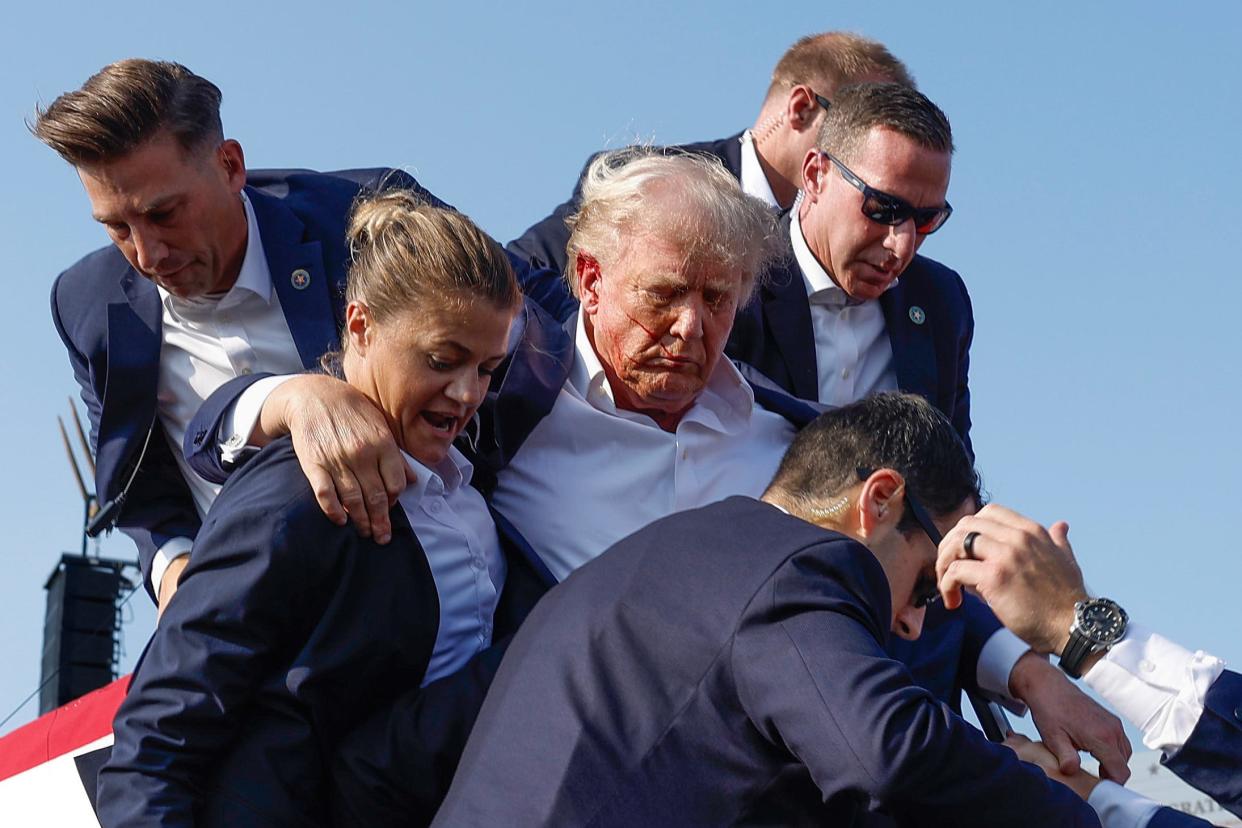Donald Trump assassination attempt made awful week in politics even worse
This was the week of the deep breath and the time of the cry for softer rhetoric. These cries reverberate for a few days, even weeks. Then the incidents they reflect become data points along the relentless timeline to an unknown end. The rhetoric returns, reheating the visceral hatred while the toxic stew simmers along.
This was the week that almost was even worse. The country was within a whisker of starting a major party convention with its nominee having been assassinated a couple of days before. Meanwhile the other party approaches its convention lacking confidence in its nominee, who had rolled virtually unchallenged through the primary process. This is no way to run the political railroad.
Conventions, driven by the party leaders of all stripes, have long become coronations of the most popular rather than gatherings to choose the most electable. Television drove that outcome as much as anything. These political gatherings are not built for decision-making, compromise or strategy. They’re built to attract eyeballs, later to be amplified by influencers.

Access has produced poisonous tribalism, not awareness
The national learning curve has flattened. The wonder of technology that provides access to so much knowledge has not produced more awareness that might lead to collective wisdom. Rather it has produced a poisonous tribalism among the often socially isolated from which the law of large numbers ensures that some people eventually emerge from the margins of society to foment tremendous damage.
Assassinations change history, almost always for the worse. World War I resulted from the shooting of Archduke Franz Ferdinand and his wife, Sophie. The “Great War” took the lives of 20 million people. The humiliation of Germany set the stage for the rise of Hitler and the unspeakable horrors of World War II.
My 10th-grade self remains an anchor. Rumors circulated that President John F. Kennedy had been shot. I took it upon myself to walk into the principal’s office. I did not have to ask. The woman at the desk looked up with tears in her eyes. She nodded and looked down. I took the news back to my friends. Our immature brains struggled to make sense of it. The supposed maturity of lived decades hasn’t helped with that task.
The Republic will survive. Until it doesn't.
As Howard Baker opined, “The republic will survive.” This is true until it is not. Let’s hope we are not there and don’t get there anytime soon. The American experiment in constitutional democracy has survived the Civil War, Reconstruction, the assassination of President Abraham Lincoln, the Great Depression, the Vietnam War, the cultural and social upheavals of the 1960s and a whole lot more.
At some point Baker’s confidence may prove to be misplaced. But that will come only when a critical mass of us are convinced that the end of desired outcomes is more important than the means of civil engagement through reasoned debate and discussion. It will come only when a critical mass of us routinely dismiss the viewpoints of others.
Dysfunction, loss of confidence and the point of no return
The bad news is that we are propelling ourselves to a point of no return. Confidence in our national institutions is fading. Dysfunction in Congress has prompted executives of both parties to turn to executive orders where legislation is appropriate.
We don’t know how to handle the administrative/regulatory state whose appointed members make decisions that can have life-or-death implications for businesses, customers and ordinary folks. Trust in the courts is fading, led by partisan assaults.
At some point the pigeons do come home to roost. The Republic may indeed survive, but only as Ben Franklin opined – “if [we] can keep it.” Lincoln put it well in another time of extreme division: “A nation divided against itself cannot stand.” It’s taking a long time to heal the wounds of that era.
July 13 was a horrendous day. Innocent people were killed or seriously wounded. The former president and the nation narrowly dodged a bullet. Why further tempt fate? Turn down the vitriol.
William Lyons is Professor Emeritus of Political Science and Associate Director of The Institute of American Civics at the Howard Baker School of Public Policy and Public Affairs at the University of Tennessee. He also served as Chief Policy Officer for Knoxville Mayors Bill Haslam, Daniel Brown and Madeline Rogero. The opinions expressed are those of the author and do not necessarily reflect the official policy or position of the Institute of American Civics or the University of Tennessee.
This article originally appeared on Knoxville News Sentinel: Trump assassination attempt made awful politics week worse | Opinion






